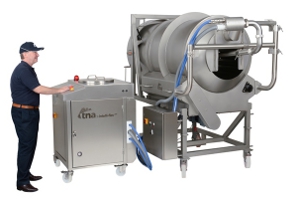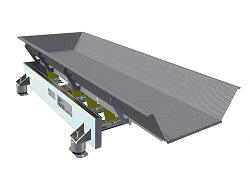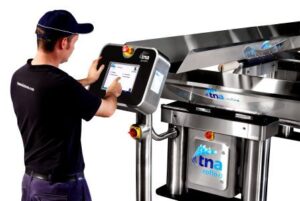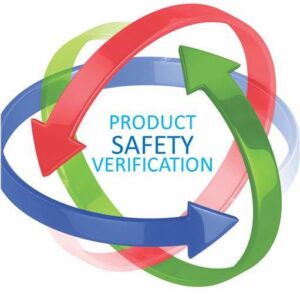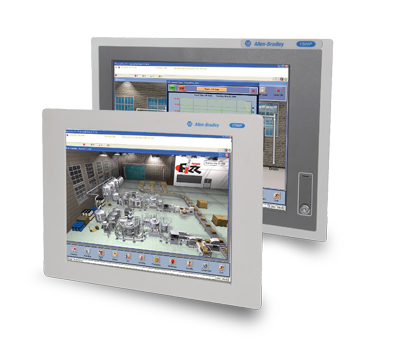How agile aftermarket support is driving resilience in food manufacturing
October 21, 2025
By Raj Singh, Group Aftermarket Manager
For years, manufacturers treated aftermarket support like a spare tyre – something to reach for only in case of emergencies. As long as it was there, it was seldom given much thought until the moment things ground to a halt. But that old mentality is getting left behind and today’s leading food manufacturers have pit crews instead: expert teams on standby, tracking every metric, ready to keep performance high and downtime low, lap after lap.
Pressure is coming from all directions. In late 2024, nearly nine in ten industry executives told McKinsey that supply chain disruption is now their number one operational concern. Add the volatility of raw material prices and an increasingly complex web of safety and sustainability regulations, and it’s clear why resilience and control have climbed to the top of business priorities around the globe.
This same volatility is reshaping expectations around OEM support. What once passed for best practice – spare parts on demand, a prompt service visit, and an annual maintenance check – now feels outdated. A 2024 survey by PMMI found that while parts availability remains the minimum standard, three quarters of manufacturers now expect OEMs to provide proactive, data-driven services as part of any support agreement, with almost a third specifically wanting preventive maintenance or operator training built into new deals.
Deloitte, in its 2024 manufacturing outlook, goes further, identifying “aftermarket services as a potential differentiator” for equipment makers helping customers navigate both talent shortages and digitalisation.
As manufacturers look for every opportunity to optimise performance, many plant managers are making the case for multi-year, “equipment-as-a-service” or subscription models that tie fees directly to improvements in uptime, energy efficiency, or other key performance indicators – a trend highlighted by industry analysts such as Deloitte.
But the benefits run deeper than a maintenance budget. The best aftermarket partnerships break down silos that have long separated maintenance, production, procurement, finance, and sustainability functions. When support is built around proactive data analysis and outcome-based agreements, hidden inefficiencies and unnecessary costs come to the surface. Automation can free up skilled staff for higher-value work, energy savings reduce both spend and emissions, and streamlined inventory management cuts risk while smoothing out procurement headaches. For many organisations, this cross-functional impact is the difference between staying competitive and falling behind.
The evolving aftermarket offering
It’s in this context that leading OEMs are evolving their own approach to aftermarket services. TNA Solutions, for example, has moved beyond the traditional service contract to offer truly tailored, need-based support. Gone are the days of one-size-fits-all. Every manufacturer faces unique pressures, from regulatory requirements to competitive demands and sustainability targets. That’s why TNA’s aftermarket programme is built on an “as-a-service” platform, providing ongoing, strategic partnership rather than just emergency fixes or annual check-ups.
At the heart of this approach is TNA’s preventive maintenance agreement, designed to keep lines running smoothly and minimise costly downtime. Our team works with each customer to create a fit-for-purpose package, combining regular maintenance with priority access to critical parts and rapid-response servicing to suit both the installed equipment and the specific needs of the business.
Another core offering is the Installed Base Audit – a comprehensive review that gives manufacturers a snapshot of their entire equipment fleet, identifying early-stage risks, inefficiencies, and opportunities for improvement. When shared with key stakeholders across the organisation, this audit becomes a catalyst for cross-functional collaboration, helping to prevent failure, minimise unplanned stoppages, and drive continuous improvement. This collaborative, data-driven approach stands in stark contrast to reactive, transactional support, and is a critical reason why more food manufacturers are making the shift.
Beyond maintenance, TNA’s aftermarket service helps customers tackle broader challenges – from streamlining inventory and procurement to supporting operational resilience. By working as a true partner, TNA enables food manufacturers to move beyond basic compliance, unlocking new sources of value and building resilience for whatever comes next.
Looking to the future, the momentum is clear. Deloitte expects OEMs to embed edge analytics and AI-powered troubleshooting into contracts by 2026, shifting much of the value from hardware to recurring services. Increasingly, manufacturers are asking suppliers to tie their own revenue to outcome-based metrics such as overall equipment effectiveness, energy intensity, or packaging material yield. With geopolitical shocks likely to persist, business continuity planning will rely ever more on installed-base visibility, turning “resilience as a service” from a buzzword into a boardroom priority.
Delivering on this promise of true resilience requires a support network that’s as agile and global as today’s industry. That’s why TNA seamlessly links local operations with global manufacturing expertise, offering the reach to grow and the support to scale. To keep every customer’s line running, all regional branches stock essential spare parts and upgrades, ensuring rapid delivery and minimal downtime wherever operations are based. This worldwide network means TNA support is always close at hand, delivered by experts who understand the unique needs of every market. For manufacturers looking to expand locally or enter new global markets, it’s the advantage of a single, trusted partner – ready whenever and wherever they’re needed most.
For leaders in food manufacturing, the message is simple but urgent: the days of relying on that spare tyre are numbered. The pace of the race is only accelerating, and the winners will be those who build pit crew partnerships: support systems that are always on, always watching, and always ready to deliver more than just a quick patch















